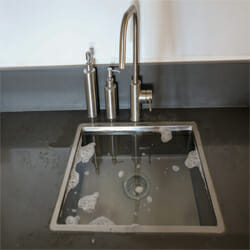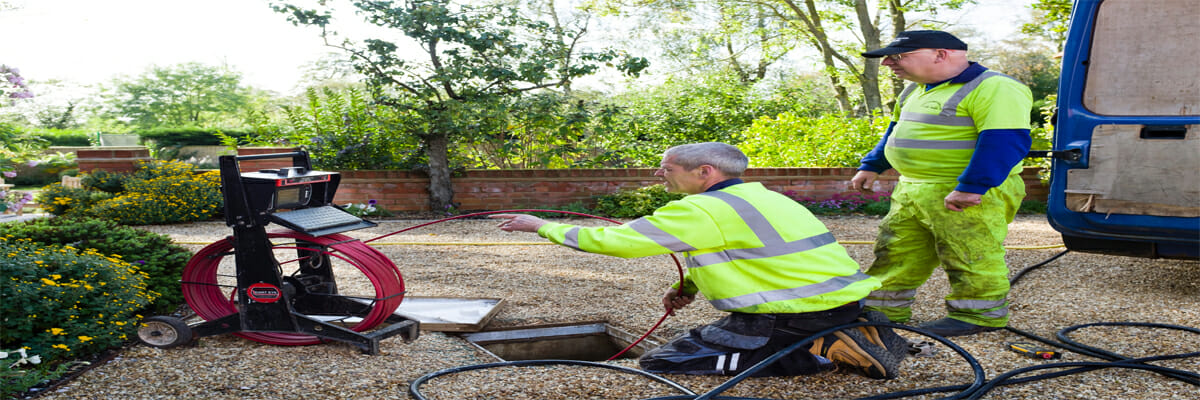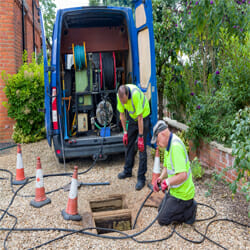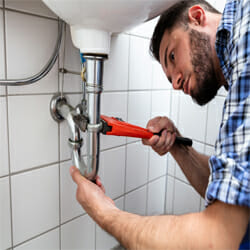Blocked drains are a common and annoying problem affecting any home or business. Blocked drains can cause water damage, foul smells, health hazards, and plumbing issues. That’s why you have to know the early warning signs of blocked drains. In this blog, we have researched and got solutions about its causes, prevention, and fixing. So you will be able to take action before they become worse.
What Causes Blocked Drains?

So, here are some of the most common causes of blocked drains:
- Grease, fat, and oil: These substances can easily become stuck in pipes and clog up drains. It happens especially when large amounts are poured down the drain or flushed down the toilet. Grease, fat, and oil can also solidify in the pipes and cause blockages when they cool down.
- Soap: Soap residue, also known as soap scum. It can accumulate over time, especially in laundry, shower, and bathroom drains. It reduces the diameter of the pipe and causes slow drainage or backups. Soap can also combine with other materials, such as hair and dirt, to make clogs.
- Hair: Human hair (as well as animal fur, or other stringy stuff, such as dental floss) is often a common contributor to clogs. Mainly in the shower, laundry, and bathroom drains. It’s particularly bad because it can knot up, combine with other substances like soap and grease. Eventually, it attaches itself to parts of the drain. Many of the most stubborn clogs have hair involved.
- Food waste: Food particles are one of the common contributors to drain blockage. Particles like coffee grounds, eggshells, potato skins, and vegetable peelings can easily get stuck in the pipes. Food waste can also rot and create bad odours in the drains.
- Wipes and diapers: Wipes and diapers are not meant to be flushed down the toilet, as they do not dissolve or break down easily. They can create large masses that block the pipes and prevent water from flowing through.
- Objects accidentally flushed: Sometimes, objects that should not be flushed down the toilet end up in the drains. Many random objects like toys, jewellery, keys, cotton swabs, feminine products, and more exist. These objects can get lodged in the pipes and create obstructions that are hard to remove.
- Cat litter: Cat litter is another item that you should never flush down in the toilet. It can clump together and form a solid mass that blocks the pipes. Also, it contains bacteria and parasites that can contaminate the water supply.
- Too much toilet paper: Using too much toilet paper can also cause clogs in the drains. Toilet paper can absorb water and expand in size. As a result, it creates a thick layer that prevents water from passing through.
- Offset pipes: These pipes moved out of alignment due to ground movement, tree roots, corrosion, or poor installation. It can create gaps or cracks that allow dirt and debris to enter the pipes and cause blockages.
- Tree roots: Tree roots are one of the most serious causes of blocked drains. Tree roots can grow into the pipes and create holes or cracks that allow soil and water to enter. And it can also wrap around the pipes and squeeze them until they break or collapse.
- Plants and leaves: Plants and leaves can also enter the pipes through cracks or holes caused by tree roots or offset pipes. Plants and leaves can accumulate in the pipes, creating organic matter that blocks water flow.
- Mineral build-up: Mineral build-up is caused by hard water containing high calcium and magnesium levels. These minerals can form deposits on the inner walls of the pipes and reduce their diameter. Mineral build-up can also react with soap and create a hard substance called soapstone that clogs the drains.
Also Read: How to Prevent Drain Blockages
What Are The Early Warning Signs Of Blocked Drains?
Blocked drains can cause a lot of problems if left untreated. So, it is mandatory to recognize the early warning signs of blocked drains.
So that you can take action as soon as possible, here are some of the early warning signs of clogged drains:
- Slow drainage: Here comes a situation when water takes longer than usual to drain from the sink, bathtub, or toilet. It means something obstructs the pipes and prevents the water from flowing freely.
- Bad smells: Another sign of a blocked drain is bad smells. If you notice a foul or unpleasant odour coming from the drains, it means that something is rotting or decaying in the pipes. This could be food waste, hair, grease, or other organic matter. These particles accumulate in the pipes, creating a breeding ground for bacteria and mould.
- Gurgling sounds: Gurgling sounds are also a sign of a blocked drain. You may hear a bubbling or gurgling noise when you use the sink, bathtub, or toilet. It shows that air is trapped in the pipes due to a blockage. The air tries to escape through the water and creates a gurgling sound.
- Water backup: Water backup is another sign of a blocked drain. You can notice if water comes back from the drain or overflows from the bathtub, shower, or toilet. It means that there is a severe blockage in the pipes that prevents the water from draining correctly. Water backup can also cause flooding and water damage in your home or business.
- Changes in water level: Changes in water level are also a sign of a blocked drain. The water level in the toilet bowl can be too high or too low. It indicates that something is affecting the water pressure in the pipes. A blockage can cause the water level to rise or fall. It depends on how it affects the water flow.
How To Fix Blocked Drains
Blocked drains can be fixed by using different methods depending on the cause and severity of the blockage.
Here are some of the methods that can be used to fix blocked drains:
- Plunging: Plunging is one of the simplest and most effective ways to fix blocked drains. This tool creates suction and pressure to dislodge clogs from the pipes. Fill the sink, bathtub, or toilet with enough water to cover the plunger head to use this tool. Place it over the drain and push and pull it up and down several times. Do it until you hear a popping sound or see the water draining faster.
- Drain cleaner: Drain cleaner is a chemical product that dissolves clogs from the pipes. You can buy this from any store or make it at your home using baking soda and vinegar. Pour it down the drain and let it sit for 15 to 30 minutes. Then flush it with hot water to wash away the clog and any residue.
- Plumber’s snake: A plumber’s snake is a long flexible wire that can reach deep into the pipes and break up clogs. It can be manual or electric and can have different attachments, such as hooks, blades, or brushes. To use a plumber’s snake, insert it into the drain and push it until you feel resistance. Then twist it or turn it on to break up the clog and pull it out.
- Pressure cleaning: Pressure cleaning is a method that uses high-pressure water to blast away clogs from the pipes. Pressure cleaning can be done using a hose attachment or hiring a professional service. To use pressure cleaning, attach a hose nozzle to your faucet and turn on the water to full force. Aim the nozzle at the drain and spray it until you see clear water coming out.
- Clean the P-trap: The P-trap attracts debris and prevents sewer gas from entering your home. It can also get clogged with hair, soap, grease, and other materials and cause slow drainage or bad smells. Place a bucket under it and unscrew the nuts holding it to clean the P-trap. Remove the P-trap and clean it with a wire or old toothbrush. Then reattach it and run some water to check for leaks.
- Check the garbage disposal: This device grinds up food waste and sends it down the drain. It can also get clogged with food particles, grease, bones, or other objects that should not be put in it. To check the garbage disposal, turn off the power and use a flashlight to look inside it. If you see any obstructions, use tongs or pliers to remove them. Then turn on the power and run some water to see if it works properly.
Read More: Steps on to Unblock an Outside Drain
How To Prevent Blocked Drains
You can prevent blocked drains by following some simple tips and habits. It will keep your pipes and drains clean and clear.
Some of the tips and habits that can prevent blocked drains are:
- Use a drain gate cover: A drain gate cover is a simple device. It fits over the drain and prevents hair, soap, food waste, and other debris from entering the pipes. A drain gate cover can be easily installed and cleaned, saving you a lot of trouble and money in the long run.
- Dispose of grease, fat, and oil properly: Grease, fat, and oil are some of the worst enemies of your pipes and drains. Dispose of them properly by letting them cool down, solidify, and then throwing them in the trash. You can also use a container or a jar to collect them and dispose of them later.
- Scrape your plates before washing: Food waste can also cause clogs in your pipes and drains. It mainly happens if you have a garbage disposal. So, scrape your plates before washing them and throw any food scraps in the trash or compost bin. You can also use a sink strainer to catch any food particles that might slip through.
- Use less soap: Soap can create soap scum sticking to the pipes and reducing their diameter. To prevent this, use less soap when washing dishes, clothes, or yourself. You can also use soap-free washes or natural alternatives such as baking soda or vinegar.
- Flush-only toilet paper: The toilet is not a trash can. So, you should only use it to flush toilet paper and human waste.
Flushing other items, such as wipes, diapers, cotton swabs, etc., can cause serious blockages in your pipes and drains. These items do not dissolve or break down easily and can create large masses that are hard to remove.
- Use hot water regularly: Hot water can help dissolve and wash away any grease, oil, or other materials that might build up in your pipes and drains. Run hot water down your drains at least once a week for a few minutes to prevent clogs. You can also add some baking soda or vinegar to enhance the cleaning effect.
- Inspect your pipes: Inspecting your pipes regularly can help you detect any signs of damage. Look for any cracks, holes, or tree roots that might affect your pipes and drains. If you notice any problems, call a professional plumber to fix them as soon as possible.
Related Articles:
Conclusion
Blocked drains are a common problem. And it can cause a lot of inconveniences and damage to your home or business. Yet, you can avoid bigger issues and save money on repairs. You just have to know the early warning signs of blocked drains and how to fix them. You can also prevent blocked drains by following these simple tips and habits. It is why we have covered all the possible areas related to this. We have discussed problems and provided their solutions in this blog. Hope you have got your answer.



 Flushing other items, such as wipes, diapers, cotton swabs, etc., can cause serious blockages in your pipes and drains. These items do not dissolve or break down easily and can create large masses that are hard to remove.
Flushing other items, such as wipes, diapers, cotton swabs, etc., can cause serious blockages in your pipes and drains. These items do not dissolve or break down easily and can create large masses that are hard to remove. Enquire
Enquire